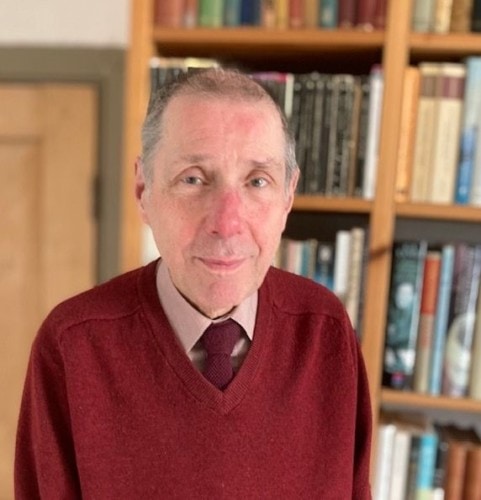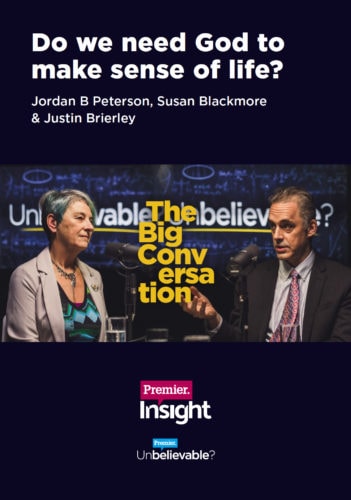
An Intellectual Journey Towards God: Philip Vander Elst’s story
Posted:Jana Harmon, host of the SIDE B Podcast with a PhD research in adult conversion, tells the story of how Philip Vander Elst came to Christian faith.
Why I’m Not a Christian
“I was taught never to believe anything on authority.
Always read it for yourself. Always think for yourself. Pursue reason and truth.”
It is commonly said that people are religious merely because the people around them are. But what happens when the people you love believe in God and you don’t. You won’t believe in God because you don’t believe it’s true, no matter what others say. At the end of the day, truth is more important than the potential of lost relationships. Philip’ story wrestles with this difficult conundrum. If he remained an atheist, he would lose the one he loved. If he became a Christian, he would compromise his intellectual integrity. Conversion for social or emotional reasons alone was unthinkable. As an intellectual, a thinker, it would be immoral and dishonest. He would be denying his highest value, holding fast to truth. How could the situation be resolved?
Philip was a true English gentleman, educated and erudite, yet accessible and transparent. His heightened respect for ‘the mental universe’ came from his family. His atheist father was “a really good man and a brilliant scientist who believed in truth.” His mother, “always taught me never to believe anything on authority. Always read it for yourself. Always think for yourself. Pursue reason and truth.” His non-Christian parents also had a history of bad experiences with the institutional church. Due to this, Philip explained, “the mentality I grew up with was – on the one hand, you’ve got science, reason and liberty and on the other hand you’ve got religion, , authoritarian government, tyranny, attacks on freedom of thought, and superstition.” While in English boarding school as a child, he was introduced to the bible through religious studies classes, but “it didn’t have any intellectual impact” on him. He also used to pray because he was “quite unhappy” at the time, although “had no understanding about Jesus or God or anything like that”. As a teenager, he began thinking about religion enough to reject it. Bertrand Russell’s book Why I’m Not a Christian ‘sowed seeds of real unbelief.’ Ayn Rand’s writings led him to become hostile to Christianity. At 17 years old, he “had forgotten all about God” until his father suddenly died, briefly opening a door towards reconsideration.
In the aftershock of that event, I started wondering whether or not there was a God. I suppose because of grief and because I wanted to see him again. And I did dip into Mere Christianity and found the early bits of it quite compelling. I didn’t go on with the book. I forgot about it. And then the veil of unbelief and hostility to Christianity closed in over my mind again. And so when I got to Oxford I was quite scornful towards Christianity and closed- minded against it, prejudiced against it. I wasn’t scornful towards individual Christians as much as the church as an institution, as superstitious and oppressive – a kind of an abstract hostility, not one that was personal.
The Moral Question
While at university, Philip studied political and moral philosophy, understanding the logical ends of his atheistic worldview but he didn’t consider himself a nihilist. Rather, he held firmly to objective moral values, considering himself “a very strong secular conservative.” Although atheism could not ground his values, for him their self-evident nature was undeniable:
To me, objective morality was self-evident. Life was valuable. The values that were appropriate to the nurture and sustenance and protection of life were the right values, so everything to do with human rights, loving your neighbor, were self-evident moral absolutes as true as the truths of mathematics. But, what I failed to see was the metaphysical implication of that position.
Philip was resolute in his atheism, grounded in naturalistic philosophy and science. The trump card for disbelief was the problem of evil, completely closing the door towards God. But, an unlikely relationship interrupted his staunch dismissal. Philip fell in love with a girl and was immediately “appalled” when he discovered she was a Christian. Meeting her Christian friends at a coffee house, he was surprised by what he found. “These young men and women were very beautiful. There was this light in their faces, and I felt that I wanted to be part of that company. But, I felt dirty like I had no right to be there.” For the first time, Philip became open to investigate the truth of Christianity, the only real criterion for belief.
I said to my girlfriend, ‘I am not going to become a Christian just because you are a Christian because I believe you should only become a Christian if you believe that Christianity is true. It is a matter of intellectual integrity.’ Then I said to her, ‘I will go on an intellectual journey of discovery to see whether I can find answers to my questions, ‘Does God exist?’ ‘Are miracles possible?’ ‘Was Jesus the son of God?’ ‘Did he perform these miracles?’ And so on.
Conversion
Philip’s search began with C.S. Lewis’ paper given to the Oxford Socratic Society, ‘On Obstinacy and Belief,’ reinforcing his ability to test the historical and philosophical evidence of Christianity. For an intellectual, it was critical that he was able to follow a rational course towards belief. Next, he read C.S. Lewis’s Miracles which “demolished” his naturalistic worldview and persuaded him of the possibility of God and the reasonableness of the New Testament miracles. Lewis also helped Philip resolve the problem of evil by pointing to the need for an external standard for judging good and evil or even offering complaint. Lewis’s writings had a significant impact on Philip towards intellectual belief in God, but not in Christianity.
By the time I had finished reading Miracles and one or two other books that Lewis had written, I was no longer hostile to the Christian message or the cross. Lewis had destroyed my atheism and disarmed my hostility. He himself had been an atheist. He had such sympathy for where unbelievers were coming from so he won my confidence and countered my prejudice. In a way, it was through reading Lewis that it was as if God was telling me, ‘Put down your guns so that we can talk.’ So that’s really what has happened. I got to the point where I believed in God. I believed that Jesus was the son of God, but I did not understand what the cross was all about.
During this time of searching, Philip feared how his family might react if he became a Christian and felt strain in his relationship with his girlfriend, if he did not. Internally battling and still confused, he prayed for the first time.
I just broke down and wept. I got down on my knees and I prayed to Jesus and I said, ‘Lord Jesus, come into my life and clean up this mess.’ And, I had perfect peace, went to bed, slept very well and went to see my friend the next evening. He started talking about the cross, that it is the atonement, the perfect reconciliation of God’s perfect justice with his perfect mercy. The penalty for sin must be paid and He pays it on our behalf, and so justice and mercy are reconciled.
So he said to me, ‘Well, all you have to do now is to ask Jesus into your life.’ And I said, ‘Well I did that last night!’ He said to me, ‘You are a Christian. You have become a Christian.’ And, it was astonishing! It was like falling in love again! It was exactly like falling in love again but twenty times more powerful! I was surrounded by this sense of love and I had become a Christian quite literally without realizing it the previous night.
His girlfriend was happy to hear the news of his conversion, but his family was not so pleased. For Philip, dedication to the truth at any social cost took precedence. Ironically, the intellectual integrity fostered by his family is what led him away from atheism and towards Christianity. He read for himself. He thought for himself. He pursued reason and truth. And, it was truth that remained of highest value when I spoke with him 38 years after his conversion. He had become a prolific writer and esteemed lecturer, working in and among forums discussing deep philosophical issues. As we closed our time together, I was taken not only by his brilliance and wisdom, but equally by his gracious generosity and warm kindness. He seemed to have taken on the beauty and light of those he once distantly admired.
19 February, 2021
Jana Harmon hosts the Side B Stories podcast where former atheists talk about their turn from disbelief to belief in God and Christianity. She is a Teaching Fellow for the C.S. Lewis Institute of Atlanta and former adjunct professor in Cultural Apologetics at Biola University where she received an M.A. in Christian Apologetics. Jana also holds a Ph.D. in Religion and Theology from the University of Birmingham in England. Her research focused on religious conversion of atheists to Christianity.
Want to learn more? Download your free, exclusive ebook: “Do we need God to make sense of Life” (featuring Jordan Peterson)
